ABUJA, Nigeria — Former Jigawa State Governor, Sule Lamido, has revealed that the selection of Olusegun Obasanjo as Nigeria’s presidential candidate in 1999 was a strategic decision made to preserve national unity, rather than favouring Yoruba elites such as Chiefs Bola Ige, Olu Falae, or Abraham Adesanya.
The revelation comes in Lamido’s newly launched autobiography, Being True to Myself, which was unveiled on Wednesday, May 13, 2025.
In Chapter 9, titled Abdulsalami’s Transition and Formation of the PDP, Lamido recounts the political calculations that shaped Nigeria’s return to democracy following the death of military ruler General Sani Abacha and the subsequent transition programme overseen by General Abdulsalami Abubakar.
Lamido argued that while the Yoruba political class sought to push forward candidates seen as champions of regional interests, leaders within the emerging People’s Democratic Party (PDP) were determined to find a candidate who could be trusted to lead as a nationalist, not as an ethnic figurehead.
“The Yoruba saw through our moves and wanted to ask to be given the choice to nominate one of three possible persons: Chiefs Olu Falae, Bola Ige, or Abraham Adesanya, but none of these could make a fair and effective president in Nigeria,” Lamido wrote.
He emphasised that the distinction was not about ethnicity alone, but about finding a Yoruba leader with national appeal.
“We wanted to find a Yoruba Nigerian President; thus, to have a Yoruba man as the Nigerian President, not a president of the Nigerian Yoruba,” he said.
According to Lamido, Obasanjo emerged as the consensus choice of retired military leaders and PDP insiders for his national credentials, military background, and prior record of impartial leadership — particularly his peaceful handover of power to Shehu Shagari in 1979, despite pressure to favour fellow Yoruba candidate, Chief Obafemi Awolowo.
“General Obasanjo, being the Head of the Military Government, simply took the right action by upholding the results of the elections,” Lamido recalled, referencing the controversial 1979 election outcome.
“This came after Chief Awolowo appealed his case… which upheld the verdict of the Federal Electoral Commission.”
Obasanjo’s perceived neutrality during the civil war, his acceptance of the Biafran surrender, and his prior service as General Murtala Mohammed’s deputy all contributed to his nationalist image, Lamido noted.
However, Lamido acknowledged that the choice of Obasanjo sparked resentment within the Yoruba political elite, particularly due to Obasanjo’s refusal to back the late Chief M.K.O. Abiola in the struggle to reclaim the annulled June 12, 1993 presidential mandate.
“His decision to disregard the raging dispute concerning the interpretation of the twelve and two-thirds victory… and hand over power to a non-Yoruba was to them his original sin,” Lamido wrote.
“The second was that he had compounded this ‘offence’ when he refused to support Chief MKO Abiola’s struggle.”
He concluded that Obasanjo and Abiola, both from Abeokuta, were bitter rivals, “divided by their individual temperament, ideology, and religion.”







![Honouring a Rare Soul: Celebrating the Life of AVM Terry Omatsola Okorodudu [MUST READ] Air Vice Marshal Terry Omatsola Okorodudu](https://www.thetrentonline.com/wp-content/uploads/2026/01/Joan-and-Bidemi-Okorodudu-The-Trent-100x70.jpg)